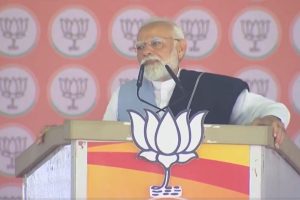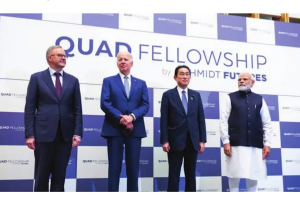Globally, 2023 has seen some extraordinary political upheavals unthinkable even a year ago. Donald Trump has made a remarkable comeback in America beating all predictions and emerging as the clear fron- trunner for the Republican Party nomination for the 2024 elec- tion, gaining more popular sup- port among his Republican base with every new indictment.
In Poland, the ruling Law and Justice Party lost a vote of confidence in Parliament after eight years in government, yiel- ding the reins of power to a for- mer European Council Presid- ent, Doland Tusk, who has pro- mised to reverse undermining judicial independence by his predecessor and other illiberal measures which led the Euro- pean Union to block billions in euros earmarked for Poland. But one of the biggest upsets was in the Netherlands where a Mus- lim-baiting firebrand, Geert Wilders, came on top in the No- vember elections, though falling short of the majority.
In Argentina, Javier Milei, a libertarian outsider who entered politics only two years ago, won the Presidential elections with 56 per cent of the vote, beating Sergio Massa of the long-domi- nant Peronist party. His victory certainly reflects Argentinians’ increasing exasperation with economic chaos which has pre- vailed since many decades, oth- erwise a rank outsider with un- paralleled eccentricities like Milei would stand no chance. An admirer of Donald Trump and Brazil’s former president Jair Bolsonaro, Milei promised to apply shock therapy to revive the economy by drastically slashing public spending, shut- ting down Argentina’s central bank and adopting the US dollar as the national currency to tame inflation. In his electoral cam- paign, he carried a chainsaw to signal his intent to drastically reduce the size of the state. In one of his first acts after becom- ing President, he devalued the peso by over 50 per cent.
Argentina is presently reel- ing under 143 per cent inflation with a 5.5 per cent fiscal deficit. Its currency has lost half of its value this year and is trading at 1000 to a dollar against the offi- cial exchange rate of only 386. Forty per cent of its population is living in poverty. Its GDP has contracted by 2.5 per cent to $622 billion in 2023 and its debt ratio has soared to 90 per cent of GDP. But it was not always like this. A century ago, Argentina was a model for development ~ it was ranked among the ten richest countries in the world, after Australia, Britain and the USA, but ahead of France, Germany and Italy. Its per capita income was 92 per cent of the average of the 16 richest econ- omies. Indeed, the Nobel laure- ate economist Simon Kuznets who gave us the method for measuring GDP had remarked: “There are four kinds of coun- tries in the world: developed countries, undeveloped coun- tries, Japan and Argentina.”
But that was well before the 1930s and before the Great Depression had convulsed the USA, and the contagion had spread to the rest of the Ameri- can continent. Argentina’s his- tory has since then been che- quered by a succession of mili- tary coups ~ in 1930, 1943, 1955, 1962, 1966 and 1976. The elec- tion of 1989 marked the first time in more than 60 years that a civilian president had smooth- ly transferred power to an elect- ed successor.
Argentinians compare their economic trajectory during the last 30 years to a pendulum ~ swinging from the loose eco- nomic policies of the 1980s to tough Washington-con- sensus liberalisa- tion in 1990s and back again under the centre-left co- alition of Peronist political parties that have dominat- ed Argentine poli- tics for decades. Juan Domingo Pe- rón, an army Colo- nel, became the President of Argen- tina in 1946. He started the so-call- ed Peronist Mo- vement based on social justice, economic nationalism, and in- ternational non-alignment.
Perón embarked on a course of industrialisation and state inter- vention in the economy for greater socio-economic benefits to the growing working class. Workers were given the much- needed benefits, but civil liber- ties were severely restricted. Perón was re-elected in 1951, but a disastrous economic decline led to his overthrow in 1955 by the army. He lived in exile in Spain for two decades before returning in 1973 to assume Presidency once again, but died less than a year later. For Argentina, things really became bad after 1975 – it faced repeated recessions during the 1970s and 1980s resulting in a debt crisis to get over which it started printing money. The result was hyperinflation – between July 1989 and July 1990, inflation rose sharply from 300 to 2000 per cent and then peaked at 20,000 per cent.
In 1991, the Argentinian peso was pegged to the US dol- lar and money supply growth was restricted by law. But with- out the necessary structural re- forms, the economy remained crippled before it was plunged into a devastating economic cri- sis in 2001-2002, when a partial deposit freeze, a partial default on public debt, and an aband- onment of the fixed exchange rate led to an output collapse causing high unemployment and socio-political turmoil.
The reasons for the decline of the Argentinian economy from its dizzying heights to the quagmire it finds itself in today are truly baffling. Argentina was rich because of agricul- tural commodities but lacked a devel- oped industrial base. Levels of lit- eracy were inco- mpatible with the demands of high growth; even dur- ing the 1940s, it had among the hi- ghest rates of pri- mary-school enr- olment in the wor- ld and the lowest rates of second- ary-school atten- dance. Industrialisation requires not only a high level of literacy but also a high level of skill which was missing. Without a good education system, Argenti- na struggled to create competi- tive industries, depending on foreign technology rather than inventing its own.
Access to credit was anoth- er problem, domestic savings being low; it had to depend on foreign capital which constitut- ed half its capital stock, making it ever more vulnerable to exter- nal shocks which duly materi- alised. Britain, its biggest trad- ing partner and a pre-eminent power before WWII, was on the decline. Further, to arrest the flight of capital, several capital controls were put in place which drained and dried foreign capi- tal, while local banks were unable to fill the gap.
Then came the Great Dep- ression of the 1930s, which cru- shed the open trading system on which Argentina’s export-led growth depended. It was forced to hike import tariffs and was increasingly becoming a closed economy under Perón, and its share of trade in GDP continued to fall. The constant interrup- tions to democracy remained a severe impediment to the evo- lution of stable state policies ~ política de Estado ~ which are essential for sustained growth. Presidents continued to tinker not only with the Constitution to give themselves more terms, but even the Supreme Court was overhauled several times after Peron did it in 1946. Spending ~ not growth ~ was the go- vernment priority, and institu- tions that could restrain the gov- ernment and initiate structural reforms were positively discour- aged. As a result, when the world economy was melting down in 2008, there was no strong insti- tutional base to absorb the shocks. No other country ever came so tantalisingly closer to becoming rich, only to slip back. It holds many lessons for other countries including ours.
As Javier Milei told the assembled crowd after being sworn in as President: “There is no alternative to austerity.” The sombre message was received with cheers, with supporters raising chainsaws into the air symbolising his promise to cut down the size of the state. It had set the tone for the shock thera- py to follow, a taste of which was given when the Economy Min- ister Luis Caputo announced deep budget cuts and devalua- tion of the peso by over 50 per cent as part of the shock-therapy programme to put the economy back on track.
Markets have applauded the moves, sending bond prices to two-year highs. Besides deval- uation of the peso, electricity and transport subsidies are being slashed, the number of government ministries is being halved from 18 to nine, public works have been suspended and federal transfers to Argentina’s 23 provinces reduced as part of his “anarcho-capitalist” libertar- ian policies. These cuts would save almost 3 per cent of GDP.
Taxes are also being increa- sed simultaneously ~ both on imports and exports ~ to raise revenue and eliminate the fiscal deficit by 2024. The IMF, which is owed $43 billion by Argenti- na, applauded the “bold initial actions”.
But thankfully, Milei has so far backtracked on his election promise to dollarise the econo- my and shut down the central bank which will automatically disappear with the peso. Dollar- isation would save the state from printing money, but it will not automatically restrain the state from a profligate fiscal pol- icy. Dollarisation would make it more painful for a country on the verge of default, since with the central bank gone there would be no lender of last resort to save the state. It may stop inflation but Milei should remember what had happened in 2001. Rather the central bank should be made independent.
In order to “restore freedom and autonomy to individuals by getting the state off their backs”, Milei has already started to “dis- mantle the enormous amount of regulations” that have crippled economic growth. But demon- strations by labour unions dom- inated by Peronists have already broken out in cities across Arg- entina. While the social cost of the reforms will be felt immedi- ately, the benefits will be uncer- tain and long term. Milei has to tread carefully, but if he fails like many others before him, Argen- tina might not get another cha- nce like this in decades.











